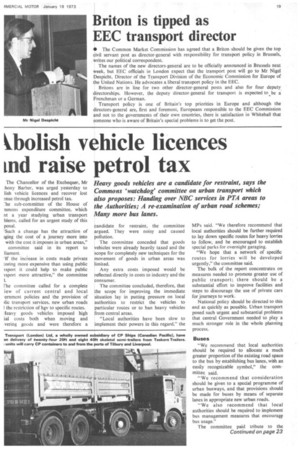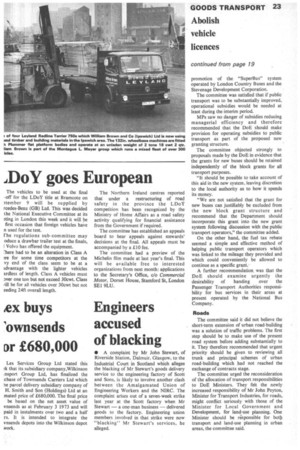tholish vehicle licences Ind raise petrol tax
Page 21

Page 25

If you've noticed an error in this article please click here to report it so we can fix it.
The Chancellor of the Exchequer, Mr bony Barber, was urged yesterday to lish vehicle licences and recover lost :nue through increased petrol tax.
he sub-committee of the House of nmons expenditure committee, which rit a year studying urban transport blems, called for an urgent study of this posal.
Such a change has the attraction of iging the cost of a journey more into with the cost it imposes in urban areas," committee said in its report to liament.
If the increase in costs made private Loring more expensive than using public isport it could help to make public 'sport more attractive," the committee
Elie committee called for a complete iew of current central and local ernment policies and the provision of die transport services, new urban roads [ the restriction of hgv to specific routes. leavy goods vehicles imposed high ial costs both when moving and vering goods and were therefore a
candidate for restraint, the committee argued. They were noisy and caused pollution.
The committee conceded that goods vehicles were already heavily taxed and the scope for completely new techniques for the movement of goods in urban areas was limited.
Any extra costs imposed would be reflected directly in costs to industry and the consumer.
The committee concluded, therefore, that the scope for improving the immediate situation lay in putting pressure on local authorities to restrict the vehicles to particular routes or to ban heavy vehicles from central areas.
"Local authorities have been slow to implement their powers in this regard, the MPs said. "We therefore recommend that local authorities should be further required to lay down specific routes for heavy lorries to follow, and be encouraged to establish special parks for overnight garaging.
"We hope that a network of specific routes for lorries will be developed urgently," the committee said.
The bulk of the report concentrates on measures needed to promote greater use of public transport; there should be a substantial effort to improve facilities and steps to discourage the use of private cars for journeys to work.
National policy should be directed to this end as quickly as possible. Urban transport posed such urgent and substantial problems that central Government needed to play a much stronger role in the whole planning process.
Buses
"We recommend that local authorities should be required to allocate a much greater proportion of the existing road space to the bus by establishing bus lanes, with an easily recognizable symbol," the COMmittee said.
"We recommend that consideration should be given to a special programme of urban busways, and that provisions should be made for buses by means of separate lanes in appropriate new urban roads.
"We also recommend that local authorities should be required to implement bus management measures that encouragp bus usage."
The committee paid tribute to the Continued on page 23 promotion of the "SuperBus" system operated by London Country Buses and the Stevenage Development Corporation.
The committee was satisfied that if public transport was to be substantially improved, operational subsidies would be needed at least during the interim period.
MPs saw no danger of subsidies reducing managerial efficiency and therefore recommended that the DoE should make provision for operating subsidies to public transport as part of the proposed new granting structure. • The committee objected strongly to proposals made by the DoE in evidence that the grants for new buses should be retained independently of the block grants for all transport purposes.
"It should be possible to take account of this aid in the new system, leaving discretion to the local authority as to how it spends its money.
"We are not satisfied that the grant for new buses can justifiably be excluded from the new block grant structure and recommend that the Department should incorporate this grant into the new grant systern following discussion with the public transport operators," the committee added.
On the other hand, the fuel tax rebate seemed a simple and effective method of helping public transport operators which was linked to the mileage they provided and which could conveniently be allowed to continue as a specific grant.
A further recommendation was that the DoE should examine urgently the desirability of handing over the Passenger Transport Authorities responsibility for bus services in their areas at present operated by the National Bus Company.
Roads The committee said it did not believe the short-term extension of urban road-building was a solution of traffic problems. The first step should be to make use of the present road system before adding substantially to it. They therefore recommended that urgent priority should be given to reviewing all trunk and principal schemes of urban road-building which had not reached the exchange of contracts stage.
The committee urged the reconsideration of the allocation of transport responsibilities to DoE Ministers. They felt the newly increased responsibility of Mr John Peyton, Minister for Transport Industries, for roads, might conflict seriously with those of the Minister for Local Government and Development, for land-use planning. One Minister should be responsible for botti transport and land-use planning in urban areas, the committee said.




















































































































